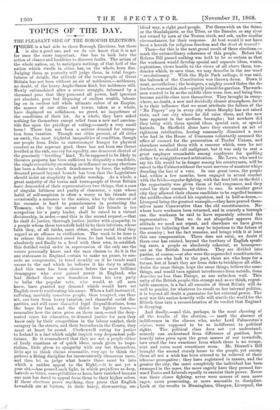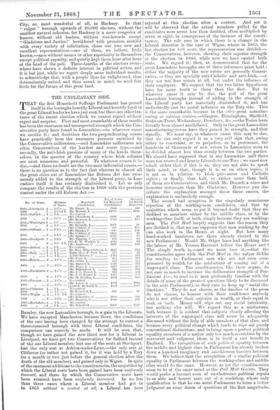TOPICS OF THE DAY.
THE PLEASANT SIDE OF THE BOROUGH ELECTIONS. THERE is a bad side to these Borough Elections, but there is also a good one, and we do not know that it is not for once the more important. One has to look into the action of classes and localities to discover faults. The action of the whole nation, or, to anticipate nothing, of that half of the nation which dwells in cities, has, on the whole, been fine. Judging them as posterity will judge them, in total forget- fulness of details, the attitude of the townspeople of Great Britain has not been without an air of nobleness,—nobleness, no doubt, of the heavy Anglo-Saxon kind, but nobleness still. Newly enfranchised after a severe struggle, informed by a thousand pens that they possessed all power, half ignorant yet absolute, poor but disposing of endless wealth, labour- ing on in endless toil while ultimate rulers of an Empire, the masses of our cities and towns, taken as a whole, have displayed no selfishness, no greed, no impatience of the conditions of their lot. As a whole, they have asked nothing for themselves except relief from a new and unscien- tific fine upon the privilege of voting,—surely a very small boon ? There has not been a serious demand for exemp- tion from taxation. Though our cities present, of all cities on earth, the most frightful inequalities of condition, though our people from Duke to costermonger hunger for physical comfort as the supreme good, there has not been one threat levelled at the rich, one cry for equality, one democrat elected of the genuinely " levelling " kind. To be supposed to be likely to threaten property has been sufficient to disqualify a candidate, the single eccentricity exercising an influence on many elections has been a desire to check drunkenness by force, the solitary demand pressed beyond bounds has been that the Legislature should insist on simplicity in public worship. As a whole, a great majority of the towns and townspeople of Great Britain have demanded of their representatives two things, that a man of singular loftiness and purity of character, a man whose habit of self-suspicion is often a worry to his friends and occasionally a nuisance to the nation, who by the consent of his enemies is hard to penuriousness in protecting the Treasury, who by the assent of half his friends is too scrupulous for a party leader, shall be raised to a virtual dictatorship, in order,—and this is the second request,—that he shall do justice, thorough justice, justice with sympathy, to a people whom these townsfolk hold to be their inferiors, whose faith they, of all faiths, most abhor, whose social ideal they regard as an offence to civilization. The work to be done is to release this detested creed from its last bond, to raise it absolutely and finally to a level with their own, to establish this derided social order in supersession of the only one the voters personally know, and the man chosen to do it is the one statesman in England certain to make no pause, to con- cede no compromise, to tread steadily on if he treads amid curses to the end which he believes it his duty to attain. And this man has been chosen before the most brilliant demagogue who ever gained power in England, who had filched these new franchises from his own party to bribe the popular vote, who would, as all men knew, have granted any demand which would have set English crowds vociferating his name. When a half-instructed, suffering, morbidly conscious people, thus tempted, can thus act, can turn from heavy taxation, and shameful social dis- parities, and still more shameful legal disqualifications, from the hope for land, and the thirst for lighter taxes,— remember how the rates press on these men,—and the deep- seated crave for education, to demand justice for men they know only by their competition in the labour market, their savagery in the streets, and their bravadoes in the Courts, they must at heart be sound. Clerkenwell voting for justice to Ireland is a fact which might inspirit very despondent poli- ticians. Be it remembered that they are not a people either of lively emotions or of quick ideas, much given to impe- rialism, little given to sympathy with any but themselves, little apt to think claims reasonable, very apt to think the gallows a fitting discipline for inconveniently clamorous races, and then let us judge what hearts those must be into which a sudden appeal to the Right,—it is not yet a year old,—has poured such light, in which prejudices so deep, hatreds so bitter, susceptibilities so keen, have vanished because one man has dared to appeal from them to their higher selves. If these elections prove anything, they prove that English townsfolk are at bottom, in their heavy, slow-moving, un- idead way, a right good people. Put Greenwich on the Seine, or the Guadalquivir, or the Tiber, or the Danube, or any river not owned by men of the Teuton stock, and ask, under similar circumstances, for their response. At best would it not have been a hurrah for religious freedom and the droit de travail?
Then—for this is the next grand result of these elections,— mark the extraordinary coherence of this people. Before the Reform Bill passed nothing was held to be so certain as that the workmen would develop special and separate ideas, wants, aspirations, views hostile to the views of all above them, ten- dencies which, to save time, we may describe in the one word " revolutionary." With the Hyde Park railings, it was said, the bulwark of the Constitution was thrown down. Down it went, nevertheless ; the besiegers, a mighty crowd thrice the de- fenders, swarmed in, and—quietly joined the garrison. The work- men wanted to be as the middle class were, free, and being free, became middle-class men themselves. They brought in every- where, no doubt, a new and decidedly clearer atmosphere, for it is to their influence that we must attribute the failure of the "No Popery" cry in every city where Murphy has not raised riots, and one city where he did raise them, and the new tone apparent in the medium boroughs ; but nowhere did they bring with them special ideas, special men, or special hatreds. In Sheffield alone have they executed an act of righteous retribution, having summarily dismissed a man who had in the House of Commons voluntarily assumed the office of counsel for the prosecution of Trades' Unions, and elsewhere assailed them with a rancour which, were he not defeated, we should call malignant, but it was only to seat a great employer remarkable among employers for quelling strikes by straightforward arbitration. Mr. Lowe, who used to say his life would be in danger among his countrymen, will be raised to the Cabinet without the most nervous of amateur whips dreading the loss of a vote. In one great town, the people had, within a few months, been engaged in actual combat. with the Irish—regular fighting, with the dead left on the field ; the opportunity was given them of full vengeance, and they voted for their enemies by three to one. In another great city they allowed their chosen candidate to be expelled because the middle-class wished his expulsion, and in half-a-dozen,— Liverpool being the greatest example,—they have proved them- selves more Conservative than the old constituencies. No- where have workmen been returned, and in scarcely a berough can the workmen be said to have separately selected the representative. That we do not altogether approve this attitude we need not repeat, and elsewhere we have given reasons for believing that it may be injurious to the future of the country ; but the fact remains, and brings with it at least this one compensation. There does not exist, we doubt if there ever has existed, beyond the territory of English speak- ing races, a people so absolutely coherent, so homogene- ous as the British householders. They are divided into parties, of course,—as also were the superseded constituencies, —there are who look to the past, there are who hope for a future, but at heart they are from duke to bricklayer all alike, desire the same things, hope the same things, believe the same things, and would turn against interference from outside, from America no less than Europe, as one unbroken wall. This unity of the British people, this strange and, as we think, regret- table sameness, is a fact all enemies of Great Britain will do well to ponder, for whatever its result on her internal politics, it is beyond all doubt a guarantee for her external power. The next war this nation heartily wills will startle the world for the fiftieth time into a reconsideration of its verdict that England is decaying.
And finally,—and this, perhaps, is the most cheering of all the results of the election, — mark the absence of indifference in the classes who, under Lord Palmerston's regime, were supposed to be so indifferent to political rights. The political class does not yet understand, scarcely can understand from difference of position, how heavily rates press upon the great masses of our townsfolk, how cruel the two exactions from which there is no escape, rent and rates, must sometimes seem. Mr. Disraeli's Bill brought the second sternly home to the people, yet among them all not a wish has been uttered to be relieved of their irksome prerogative ; they have registered in masses, and the greater the city, the more completely the individual has been swamped in the mass, the more eagerly have they pressed for- ward Tories and Liberals equally to exercise their power. Never was there closer fighting, never were masses of men more eager, more persevering, or more amenable to discipline. Look at the results in Birmingham, Glasgow, Liverpool, the City, or, most wonderful of all, in Hackney. In that " vulgar " borough upwards of 20,000 electors, without the smallest natural cohesion, for Hackney is a mere congeries of houses, without old leaders, without watchwords except "Gladstone and Justice!" bewildered with promises, assailed with every variety of solicitation, chose out two new and excellent representatives—one of them, we believe, little known,—men without names or other superiority to themselves except political capacity, and quietly kept them hour after hour at the head of the poll. Three-fourths of the electors every- where have shown a definite interest in political action, and it is but just, while we regret deeply some individual results, to acknowledge that, with a people thus far enlightened, thus determinately united, and thus sound in mind, we need fear little for the future of this great land.







































 Previous page
Previous page